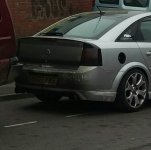So apparently 1400kg versus 10kg + of pm matter released at street level where people are likely to breathe it. Quite literally choose your poison..
Don't forget petrol cars still produce particular matter and NOX, just because diesels release more it doesn't mean petrol cars exhaust is spotlessly clean.
In essence if you removed all the diesel cars from the road, and it's safe to assume a fair amount of those would be replaced with petrol cars, out CO2 output will be the next thing we'll be getting fines for and Green Party members will be screaming "will someone think of the children" down a camera lens on the 6 o'clock news.
Petrol owners like to rubbish diesels but are oblivious to the problems their own cars pose and that is my issue here, I am not of any belief that my car is the cleanest on the road but my view is that no diesel car is any worse that it's direct petrol equivalent, they both pollute just in different ways, and no one is really saying what is worst in the long term.


